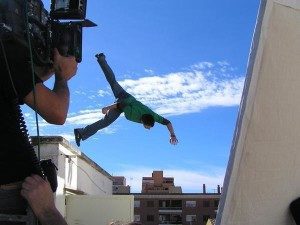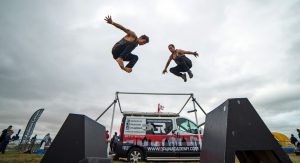Life after Parkour for the Parkour Athlete.
A sustainable career option?
 A question that many a Parkour athletes will have encountered on a frequent basis is questions surrounding the longevity of the decision to pursue a career in the industry. Criticisms can include that it’s only a suitable career choice for a very short time frame because of the limitations of age in being able to perform the acrobatic movements. Plus due to the potential for injuries from repetitive impact from performing jumps. This leads to the question ‘What can a Parkour athlete do once the peak of his/her career has passed?’
A question that many a Parkour athletes will have encountered on a frequent basis is questions surrounding the longevity of the decision to pursue a career in the industry. Criticisms can include that it’s only a suitable career choice for a very short time frame because of the limitations of age in being able to perform the acrobatic movements. Plus due to the potential for injuries from repetitive impact from performing jumps. This leads to the question ‘What can a Parkour athlete do once the peak of his/her career has passed?’
Perhaps the frequency for this question is apparent because the reality is, that Parkour athletes have an abundance of options of what to do next, once the prime of their career has passed. There is no one correct and set path after “performance retirement”.
Indeed, the journey to becoming a successful and reputable Parkour athlete leaves you with a well- rounded and diverse skill set that lends itself to success in multiple areas of life after the days of hitting corks in films has passed. More broad life skills such as persistence, time management and self-discipline are essential to train enough to make it at the top of the Parkour scene. Such skills are transferable and useful to all other aspects of life too. Whereas on a more specific and practical level, it’s not uncommon for an athlete to gradually acquire an understanding of skills such as photoshop, video editing, website design etc… which collectively creates a resume of high appeal to potential employers afterwards. Furthermore, as the importance of social media as a business tool begins to rise, as does ex-Parkour athletes’ desirability to employers too, as a result of the knowledge they have acquired in the field of social media from the following they have built.
Additionally, the nature of being a Parkour athlete and particularly one that plays a role in a team of athletes, brings with it contact with people from numerous industries, such as film and television, social media, clothing and much more. Consequently, athletes usually leave their career in Parkour as highly networked people to wider society.
It’s inevitable to receive scepticism from some people when saying that you wish to pursue a career in Parkour. But a good piece of advice that stands true in many aspects of life is to take advice from people who are further down the road map on the path that you personally want to take. You wouldn’t take directions from someone in a city that they’ve never visited?
So, if Parkour is your passion or anything else for that matter, then follow it. Because consistent action comes so much easier when you find fun and enjoyment in what you do.

As discussed, Parkour can help build you a foundation of diverse skills for pursuing careers and personal business opportunities in multiple areas of life following “Performance retirement”. The best approach is to enjoy fully the moment of being a Parkour athlete and performing on a regular basis, but to always keep an eye on opportunities to build sustainable income once the day of “jumping off buildings” becomes that bit less practical for you in older age.

